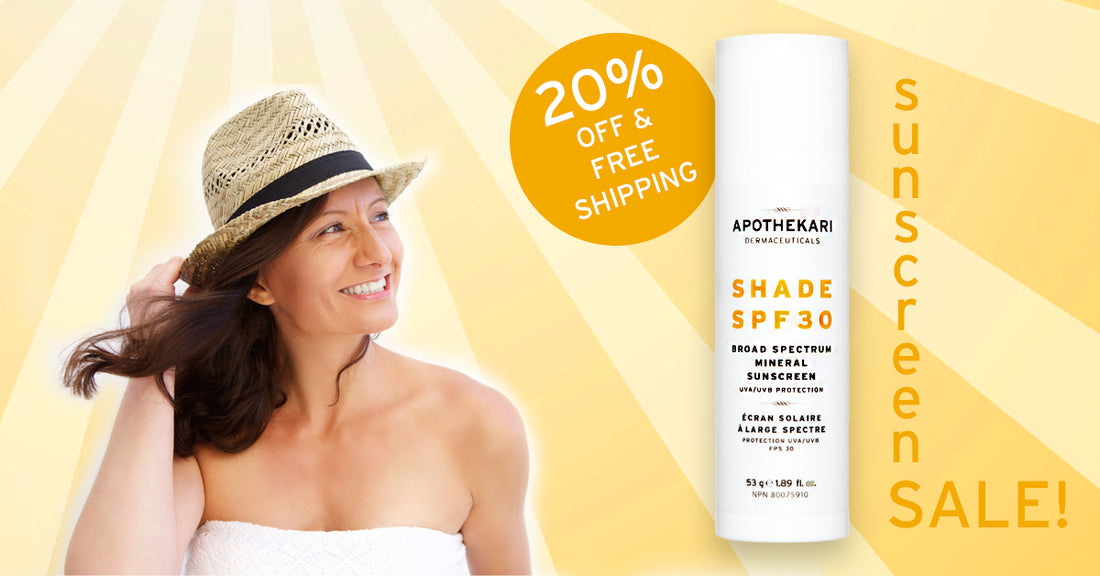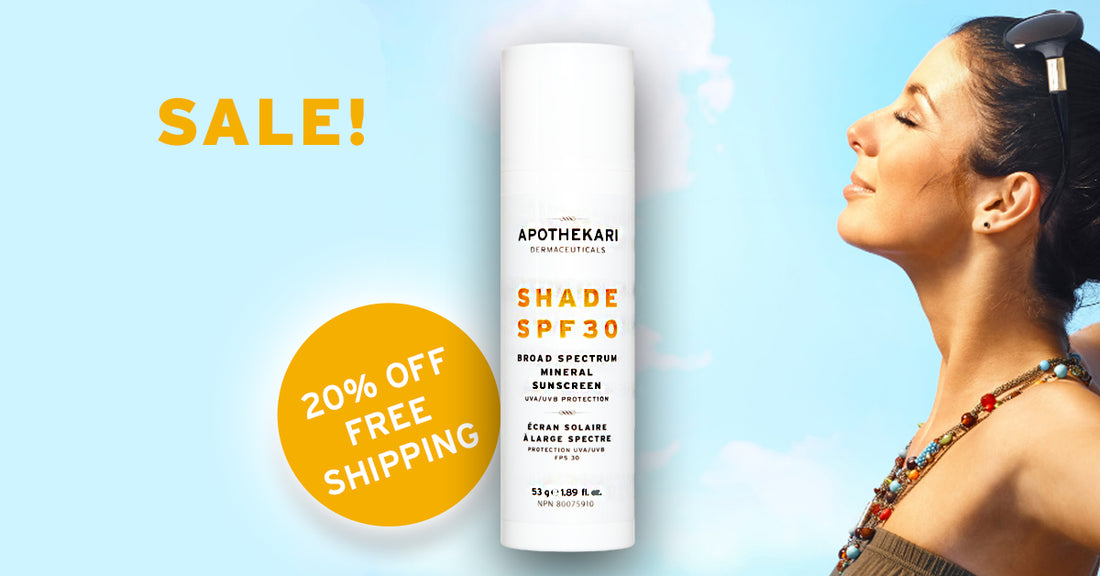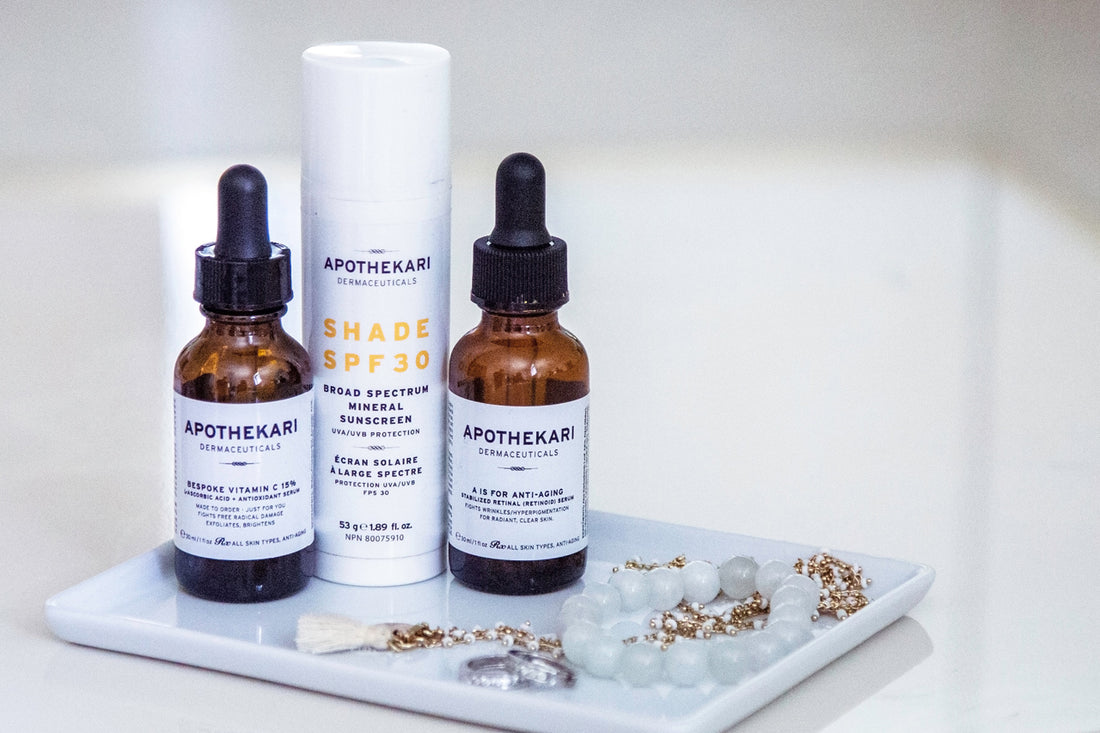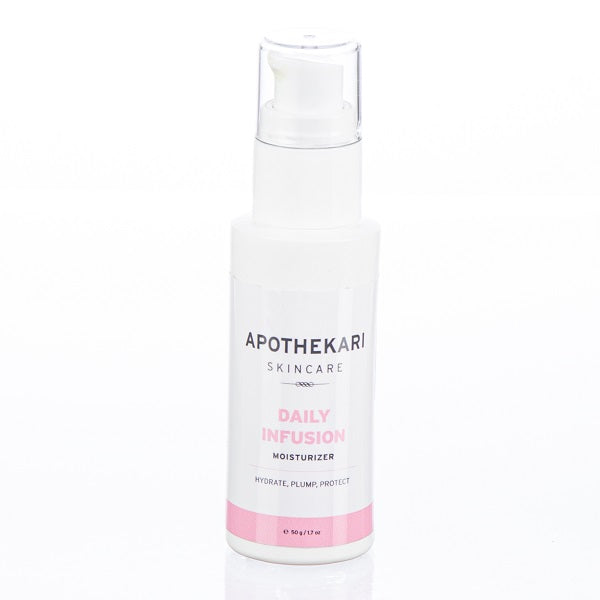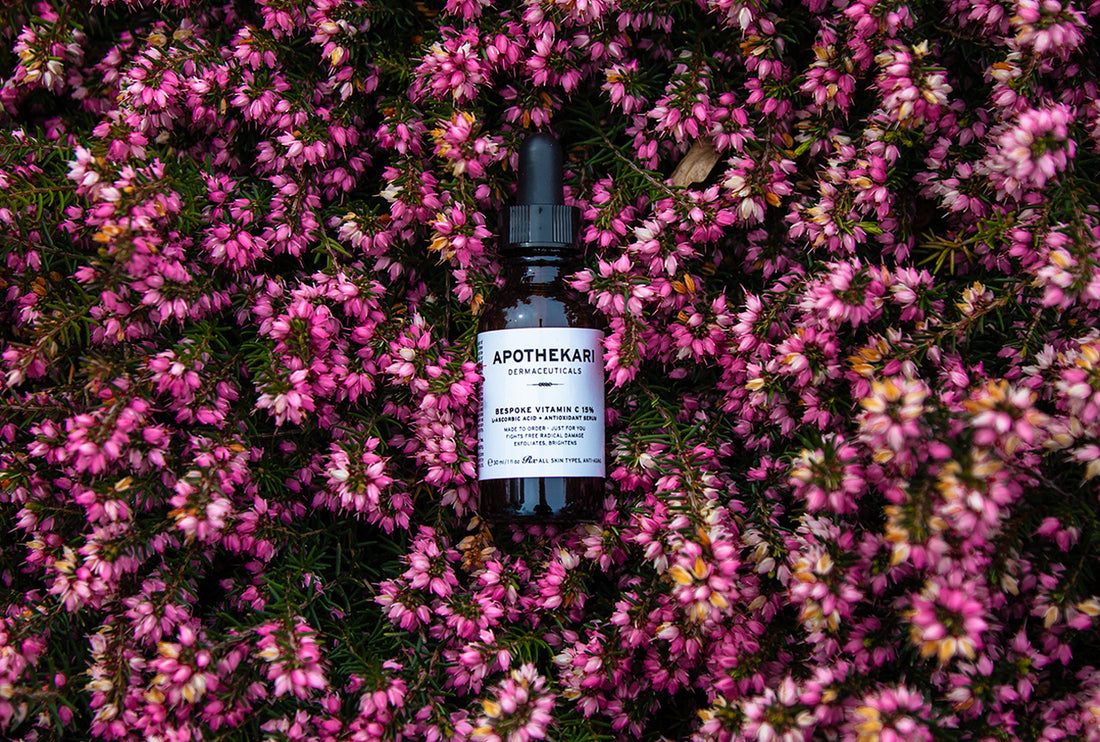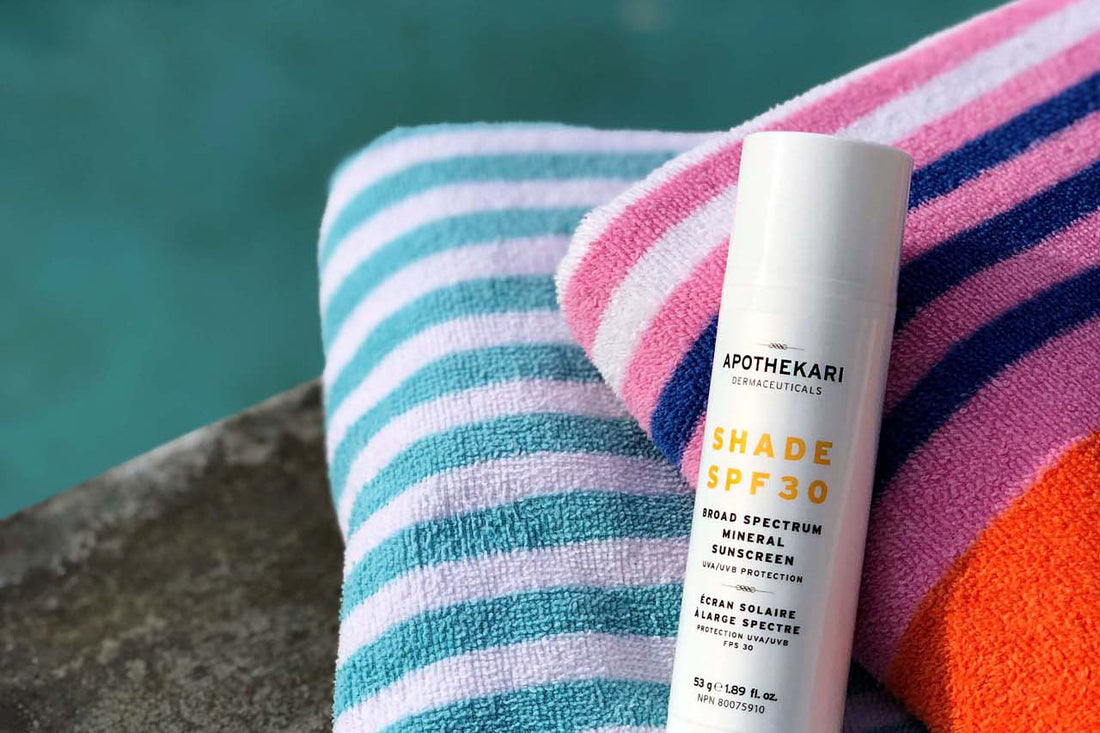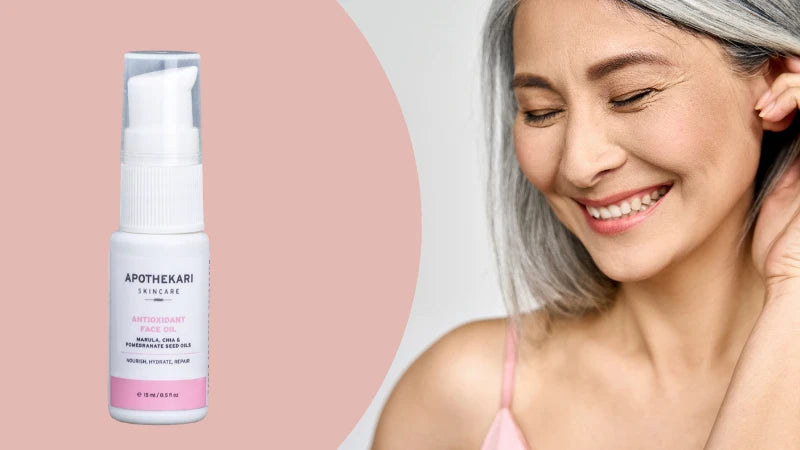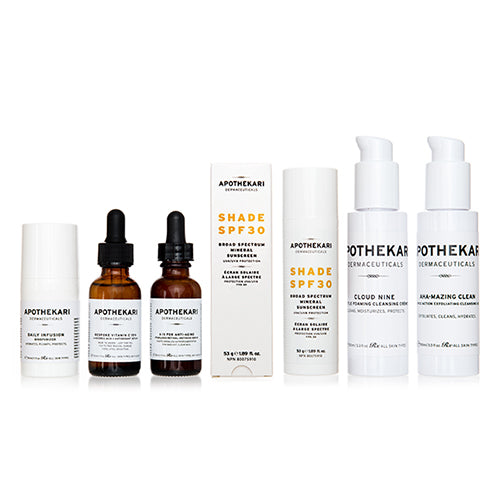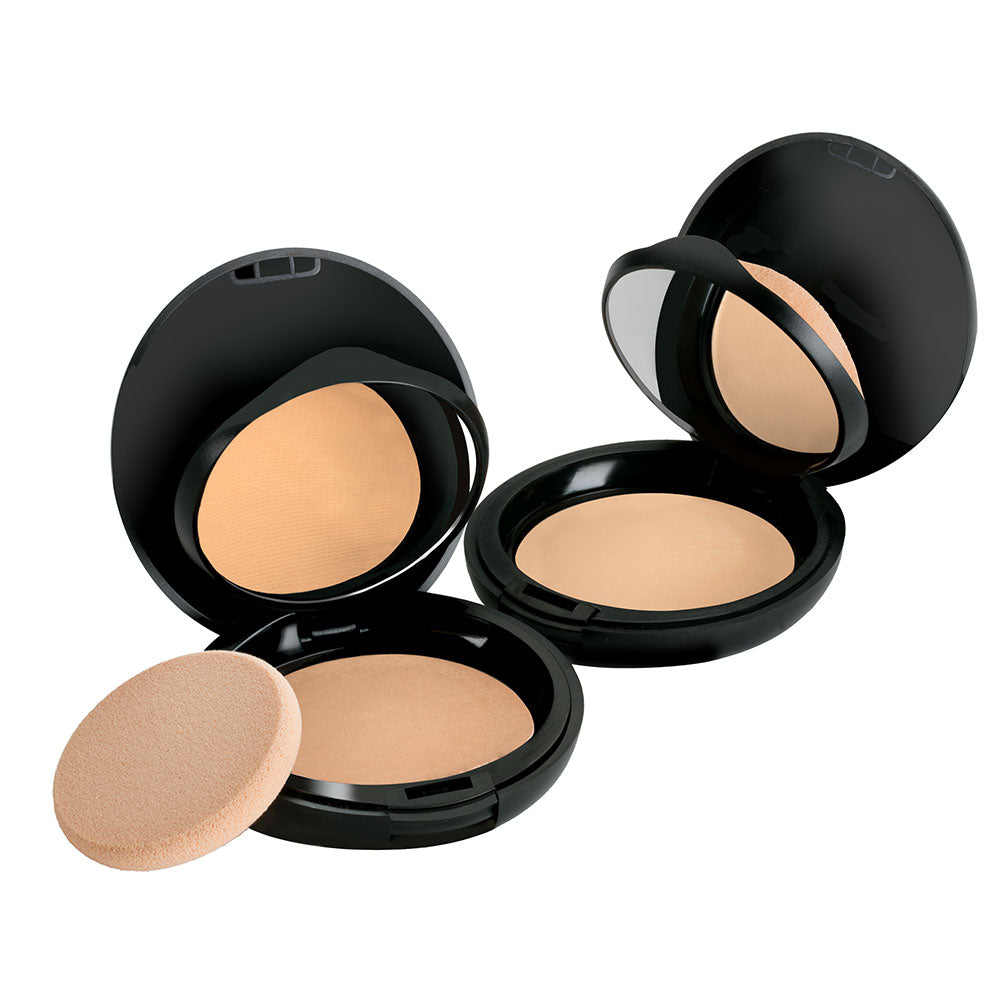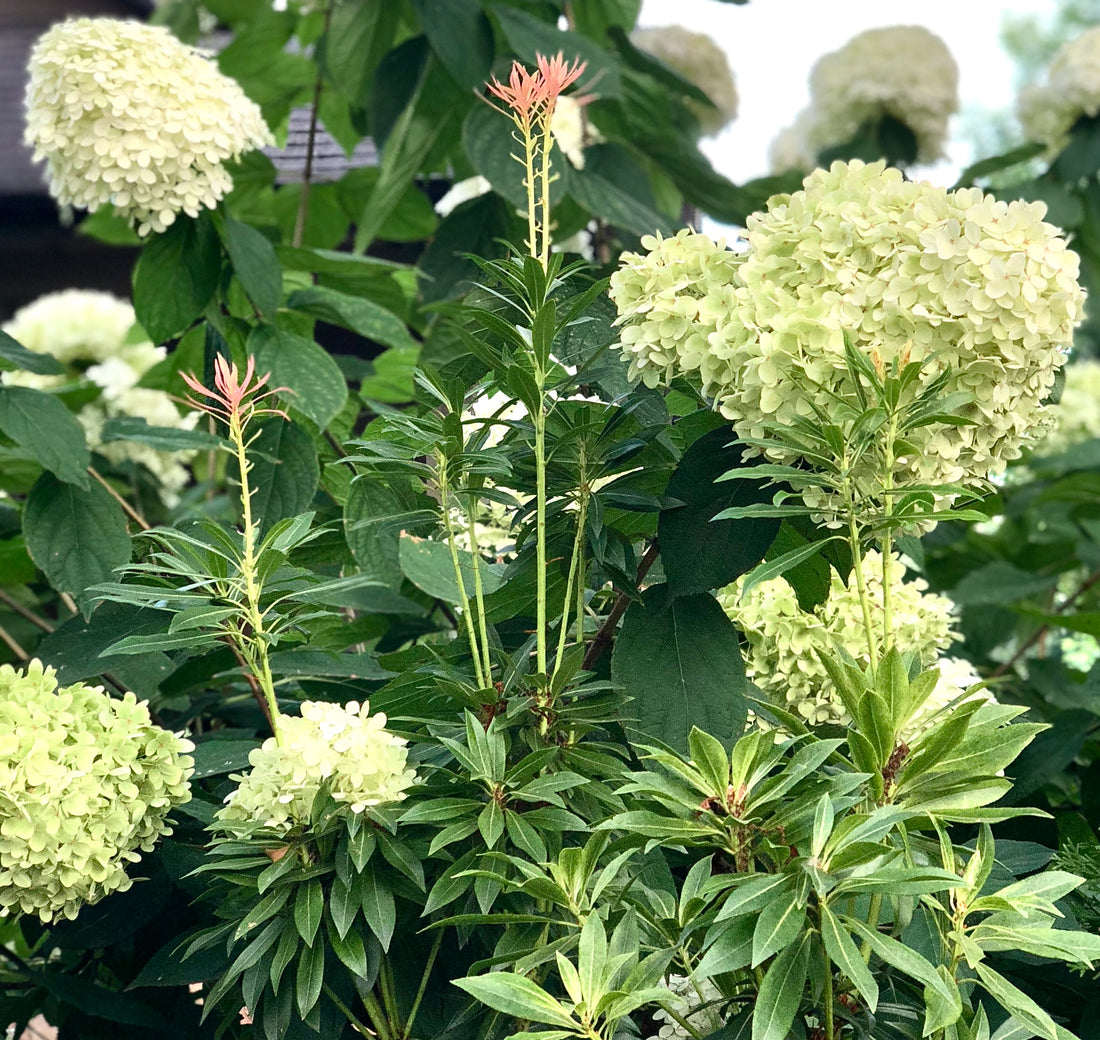Blog
Sunscreen Promotion - Be Safe In The Sun!
20% OFF & FREE SHIPPING Apothekari Shade SPF 30 Sunscreen Promotion Be safe in the sun! Prevent sun damage with a naturally safe sunscreen. Apothekari Shade SPF 30 Benefits: Mineral based (zinc oxide) Non-whitening & non-greasyBroa d spectrum UVA/UVB protection Antioxidants defend against free radicals Our sunscreen promotion continues and ends June 7, 2019 or while supplies last. Maximum of 3 sunscreens per customer. More About Apothekari Shade SPF 30 Contains ingredients that heal, soothe and calm skin Health Canada approved sunscreen Physical blocking sun filter is not absorbed into the bloodstream Ideal for sensitive skin, rosacea and/or melasma (hyperpigmentation) Apothekari Clean Skincare Formulations You’re concerned about what you put on your skin and we are too. Our clean skincare formulations are made with naturally safe ingredients that are also free from: Aluminum Baking Soda Silicone Parabens Phthalates Formaldehyde Synthetic Colourants Synthetic Fragrances SLS (Sodium Lauryl Sulfate) and SLES (Sodium Laureth Sulfate) And, Apothekari Skincare products are never tested on animals. Except the human kind, of course! Apothekari Skincare products are registered with Health Canada. Read more about us here… Photo credit: Yasmeen Strang Photography
Learn moreSunscreen Sale - Get Ready for Summer!
20% OFF & FREE SHIPPING Apothekari Shade SPF 30 Sunscreen Sale Get ready for summer! Protect your face with a naturally safe sunscreen. Apothekari Shade SPF 30 Benefits: Mineral based (zinc oxide) Non-whitening & non-greasy Broad spectrum UVA/UVB protection Antioxidants defend against free radicals Sunscreen sale ends June 7, 2019 or while supplies last. Maximum of 3 sunscreens per customer. More About Apothekari Shade SPF 30 Contains ingredients that heal, soothe and calm skin Health Canada approved sunscreen Physical blocking sun filter is not absorbed into the bloodstream Ideal for sensitive skin, rosacea and/or melasma (hyperpigmentation) Apothekari Clean Skincare Formulations You’re concerned about what you put on your skin and we are too. Our clean skincare formulations are made with naturally safe ingredients that are also free from: Aluminum Baking Soda Silicone Parabens Phthalates Formaldehyde Synthetic Colourants Synthetic Fragrances SLS (Sodium Lauryl Sulfate) and SLES (Sodium Laureth Sulfate) And, Apothekari Skincare products are never tested on animals. Except the human kind, of course! Apothekari Skincare products are registered with Health Canada. Read more about us here… Photo credit: Yasmeen Strang Photography
Learn moreAll Skin Needs These 3 Anti-Aging Products
All skin benefits from 3 anti-aging products in order to keep it looking its very best – a sunscreen, an antioxidant treatment and a retinoid. In this post, we’re diving into why these products are so important if you’re interested in maintaining healthy and beautiful skin. (This set has been discontinued. Consider our Ageless skin set instead) Shop Apothekari Ageless Skin Set Here’s How Your Skin Ages Skin ages in two main ways – extrinsically and intrinsically – discussed in detail in an earlier post. Extrinsic aging occurs as result of things happening outside our bodies – UV rays, pollution, smoking & smoke exposure as well as diet and lifestyle. These factors are the biggest contributors to skin aging and can lead to thick and coarse skin, age spots and wrinkles. They can also influence the development of many types of skin cancer. Over time, ultraviolet light can damage elastin, collagen and glycosoaminoglycans (GAGs), proteins and sugars naturally found in skin and which help to keep it firm, supple, hydrated and line free. Intrinsic aging occurs naturally over a period of years and is related mainly to our genetic make-up along with hormonal and metabolic processes. If you’re interested to know more, we’ve written a detailed post on what happens to skin at menopause . Don’t be disheartened, though. If you’ve been dealt a bad hand when it comes to your genes, a healthy lifestyle, along with the right kinds of skincare products, can help to counteract many of the effects of your genes. All Skin Needs These 3 Anti-Aging Products Preventing skin damage is one of the best things you can do for your skin in the long term. Exposure to the sun’s rays is thought to be responsible for more than 80% of skin aging and ultimately leads to skin that is saggy, less resilient, wrinkled and possibly discolored. Anything you can do to protect skin from this damage is your best insurance against the effects of aging. Additionally, products that perfect skin to correct damage or imperfections are just as important. These 3 anti-aging products are the ones backed by clinical research and years of experience as offering the most benefit to skin: Sunscreen. A sunscreen that protects against both UVA (AGING) and UVB (BURNING) rays is essential to any skincare routine. Apothekari Shade SPF 30 delivers just that in a non-whitening, mineral based (zinc oxide), non-greasy formulation. Antioxidant. Antioxidants help to protect skin from damage caused by free radicals when we’re exposed to sunlight and pollution, for example. They should be applied to skin every morning along with sunscreen because they help boost the effectiveness of one another. You can find the most widely researched antioxidant, Vitamin C (as L-ascorbic acid) plus a range of other skin beneficial antioxidants such as ferulic acid, green tea, astaxanthin, alpha lipoic acid and pomegranate seed oil in our Bespoke Vitamin C Serum, made fresh for each order. Retinoid. We LOVE retinoids at Apothekari! Retinoids are a class of ingredients that are derived from Vitamin A and which include prescription retinoic acid and tazarotene plus over the counter options such as retinol and retinaldehyde. In addition to helping boost collagen and elastic production, they increase skin cell turnover (getting new, healthy skin cells to come to the surface), reverse sun damage and minimize the appearance of wrinkles and fine lines. We are big fans of retinaldehyde, which delivers results while being one of the gentlest retinoids, making it suitable for most skin types. Retinaldehyde also has antibacterial effects, making it a useful addition to the management of acne. Find retinaldehyde in A is for Anti-Aging, where it is combined with other skin beneficial ingredients. Are you ready to up your skincare game with these 3 anti-aging skincare products?
Learn moreA Light Face Moisturizer for Warmer Weather
If you’re looking for a face moisturizer for warmer weather, Apothekari Daily Infusion Moisturizer may be just what you’re looking for. In this post we’re discussing tips to help you find one that’s just right for your skin. Want information about moisturizers in general? Check out this post we wrote earlier. Shop Daily Infusion Moisturizer A face moisturizer is a product that we apply to skin to relieve dryness and make it feel more comfortable. They can range from lighter serums and lotions to heavier and thicker treatments such as petroleum jelly (although this isn’t something we’d recommend!). Water qualifies as a moisturizer, but because it evaporates quite quickly, it’s not very effective on its own. The ideal face moisturizer falls somewhere in between water and petroleum jelly and many customers find that a product like Apothekari Daily Infusion Moisturizer works perfectly for them all year round because it moisturizes without leaving skin feeling greasy. It’s also suitable for all skin types. Moisturizer Ingredients Moisturizers are made up of three main types of ingredients: Humectants. Deliver moisture to skin by either grabbing it from the environment or pulling it from the skin’s deeper layers (dermis) to its surface layers (epidermis). Hyaluronic acid (sodium hyaluronate), glycerin, propanediol, honey and propylene glycol are all examples. Emollients. Soften and smooth skin by filling in the gaps. May also lock in moisture. Fats and oils like vitamin E, cholesterol, jojoba oil and some silicones are emollients. Emollients may also have occlusive action. Occlusives. Work by forming a thin, oily layer over skin, helping to lock in moisture. They should be applied over damp skin, ideally. Lanolin, beeswax, petroleum jelly and fatty alcohols like cetyl alcohol and stearyl alcohol are occlusive. Some occlusives may also have emollient activity. The combination and amounts of each ingredient influence how light or heavy a moisturizer feels. A Face Moisturizer for Warmer Weather Humidity (the amount of moisture in the air) changes depending on where you live or the season. Tropical locations and summer often bring higher humidity while winter and desert or cooler climates tend to be drier. A heavy moisturizer (one with more emollient and occlusive ingredients) that was perfect for cooler winter temperatures may feel too heavy now. If you find that your skin is left feeling greasy or oily now that it’s warmer outside, it may be time to revisit the moisturizer you’re using. Opt for one that contains fewer occlusive ingredients and that contains more humectant ingredients. Our Daily Infusion Moisturizer has a good balance of humectants (glycerin), light emollients (caprylic/capric triglyceride, coco-caprylate/caprate, squalane) and occlusives (cetearyl alcohol, cetearyl glucoside, glyceryl stearate) to deliver light moisture that all skin loves. We refer to it as the ‘Goldilocks of Moisturizers’ because most of our customers feel it’s just right! Tips: In order to maximize the effectiveness of your moisturizer, keep the following in mind: Apply over damp skin to lock in moisture. Moisturize as often as you need to. Don’t forget sunscreen to help protect skin against damage from UV rays. Now you and your face are ready for summer!
Learn moreHow to Choose the Best Vitamin C Serum for Your Face
What is Vitamin C? If you’re serious about skincare, you likely know that vitamin C (as found in our Bespoke Vitamin C 15% Serum) is a must have in your routine and in this post, let’s help you find the best vitamin c serum for your face. Buy Bespoke Vitamin C 15% Serum Vitamin C belongs to a group of molecules known as antioxidants, substances which stop oxidation, a chemical reaction that results in the production of free radicals. Often referred to as ROS – reactive oxygen species – free radicals are harmful substances which can damage cells. The sun’s UV rays, pollution and cigarette smoke are some of the biggest contributors to the development of free radicals. Antioxidants like vitamin C are able to protect against free radical damage by donating one of their electrons to stop the chain reaction that results in damage. They do this without making themselves unstable. Damaged proteins, lipids and DNA in skin accelerate the aging process resulting in a change in skin structure. They can also trigger inflammation, leading to a breakdown of collagen. The end result? More wrinkles, fine lines, hyperpigmentation, saggier skin along with some types of skin cancer. Why You Need a Vitamin C Serum Our bodies manufacture some antioxidants, which deliver a range of body-wide benefits, but vitamin C isn’t one of them. In order to obtain adequate amounts of Vitamin C, it’s important to consume foods like fruits and vegetable (citrus fruits, guavas, bell peppers and kiwi fruit contain high amounts), which are rich in this important vitamin. Vitamin C is involved in many bodily processes: Collagen production Neurotransmitter production Plays a role in protein metabolism Assists with wound healing. Its antioxidant properties help limit the damage caused by free radicals and may help to prevent the development of certain diseases including cancer. A lack of vitamin C leads to scurvy, that condition experienced by sailors on long sea voyages in the mid-19th century. Vitamin C Skin Benefits Vitamin C is a normal part of the skin’s makeup, but aging causes a decline. Excessive exposure to UV light, pollution (including smoke and ozone) can also lower the skin’s Vitamin C content. While skin benefits from a vitamin C rich diet, skin care experts agree that topical application is the most efficient way to get good concentrations to skin where it helps in several ways: Limits damage caused by UV rays Contributes to collagen synthesis which helps to support skin Increases skin hydration. Studies suggest that vitamin C helps skin retain moisture by reducing transepidermal water loss (TEWL). Additionally, it may promote the synthesis of lipids, which helps to further protect against dryness. Skin Lightening/Brightening. Vitamin C reduces the production of melanin, which can help to lighten and brighten skin tone. How to Choose the Best Vitamin C Serum for Your Face L-ascorbic acid is the form of Vitamin C that has the most research to back up its skin benefits, but many other effective forms of Vitamin C are available as well. This includes ascorbyl glucoside, amino ascorbyl phosphate, sodium ascorbyl phosphate, tetrahexyldecyl ascorbate, magnesium ascorbyl phosphate, etc. All can help skin and should be evaluated individually when deciding which is the best vitamin c serum for your face. If you decide that the best vitamin C serum for your face is one that contains L-ascorbic acid, ensure that you purchase from a reputable brand. L-ascorbic acid, while highly effective, is also notoriously unstable. If a serum you are using contains this ingredient and is dark in colour or smells odd, don’t use it as it has likely oxidized and will be ineffective and potentially harmful to your skin. At Apothekari, each bottle of our L-ascorbic acid serum – Bespoke Vitamin C Serum – is made to order ensuring that every bottle is safe and effective for 6 -8 months after purchase. Vitamin C works best when combined with other antioxidants including Vitamin E, ferulic acid, green tea, resveratrol and coenzyme Q10, to name a few. Skin benefits most from formulations containing a combination of ingredients, which work together to deliver benefits. Wherever possible, Vitamin C serums should be applied in the morning prior to UV exposure as UV rays are one of the biggest generators of free radicals. Are you ready to choose the best vitamin C serum for your face?
Learn moreA Naturally Safe Sunscreen for Spring Break
In this post, we’re discussing a naturally safe sunscreen for spring break including some tips on how to choose one and use it for maximal benefit. A Safe Sunscreen: For A Snow or Sun Break If you live in most parts of North America or Northern Europe, it’s the time of year when a little getaway is just what many of us are craving! Whether you’re a winter person or a summer one (us over here), you’re going to need a sunscreen for your vacation. And although you may question the necessity for sun protection if you’re planning a ski holiday, bear in mind that the sun’s UVA rays (those ones associated with aging) are prevalent year-round, regardless of season. Additionally, snow is very reflective (4 times more so than sand) and UV light also increases with altitude, so it is possible to not only damage the skin, but also to burn. Regardless of your destination – beach or ski slope – an effective and safe sunscreen is non-negotiable. Choosing a Safe Sunscreen: Physical or Chemical Now that the travel arrangements have been organized, it’s time to choose a sunscreen, a choice that can be overwhelming given the multitude of products available for you to pick from. Your first decision is to decide between a chemical or a physical sunscreen, or one that contains a combination of both types of ingredients. Chemical sun filters work by absorbing UV rays and converting them into harmless energy. Physical sun filters work primarily by blocking or deflecting UV rays but they may also absorb UV rays as well. The choice is yours when it comes to a formulation and neither is right or wrong; it’s down to a matter or personal preference. When it comes to SPF, look for a minimum of SPF 30, recommended by most skin care experts. Many of us looking for a safe sunscreen, opt for ones that contain physical blocking ingredients like zinc oxide or titanium dioxide. Zinc oxide is a soothing ingredient and a great choice for sensitive skin. It is also the sun filter shown to be most protective for hyperpigmentation so is a good choice if you have melasma or dark spots. Apothekari Shade SPF 30 is formulated with ZinClear, a form of zinc oxide that goes on clear (no white, ghost-like effect here!) and delivers protection against both UVA and UVB rays. It also contains antioxidants to help deliver additional protection against UV rays. It’s the sunscreen that always travels with us at Apothekari! Keep in mind that Shade SPF 30 is not water resistant. If you need a water resistant formulation, shop our full range of sunscreens over at our partner site PhaMix.com. Application Tips for Sun Safety Now that you’ve chosen a safe sunscreen, it’s important to apply it correctly. Here’s how: Apply BEFORE going outside – allow about 15 minutes. Apply enough. Studies have shown that most of us don’t use enough sunscreen to get the labelled SPF benefit on the box. Be generous with application (a shot glass for the whole body; about ½ teaspoon for the face). Don’t forget areas like the tops of your feet, lips and ears. Reapply. Especially if you are swimming or sweating, apply every 2 hours. All set? Where are you going?
Learn moreHow to Set Skin Care Intentions for 2019
Ever wonder about resetting habits—like skincare intentions—for a New Year? May sound a bit woo, but bare with me, self care is essential to ensure your wellbeing. And what better time to make it a priority than the start of this year? While I’ve abandoned New Year’s Resolutions, which often end up seeming difficult once we reach mid January, these days I’m leaning towards more simple and achievable goals which are easier to stick to and more achievable. For this first blog post of 2019, let’s kick things off with a slightly more mindful post focusing on skin care intentions. And before you think I’ve gone TOTALLY woo woo on you, we’re still going to be discussing skin care but looking at it in a slightly different way. While there are companies that meditate over and bless their products while chanting and playing music before they are packaged and shipped to customers and retailers, I’m not convinced that’s the path for Apothekari. (However, never say never!). Our intention at Apothekari is to cut through the confusion, simplify the process and deliver skin care treatments formulated with ingredients that have scientific proof to back them up. Nevertheless, I recognize that what we put on our skin not only nourishes our skin, but also can play a role in our emotional well-being. The sensory experiences of aroma and touch associated with skin care have a connection to our inner beauty that cannot be discounted. When we approach skin care as part of our self care, we accept it as a way of feeling good about ourselves rather than as a chore or as an indulgence. 3 Skin Care Intentions for 2019 For 2019, I’m focusing on 3 ways to be more mindful when it comes to the care of our skin: 1. Think About What You Eat As the body’s largest organ, our skin reflects what we put into our mouths. I’m not sure about you, but after consuming way too much sugar, an abundance of heavy dinners and alcoholic cocktails, my skin often reflects the culinary abundance by the time the New Year rolls around. My body craves warm bowls of nourishing soups, crisp vegetables and leaner fare. I find that a structured eating plan makes perfect sense for the New Year. I’ve embarked on the Whole30 Challenge in past years, but this year I’m focusing on being more mindful about what I eat and appreciating the impact that this has on the health of my skin and overall wellness. Whatever works for you – a juice cleanse, calorie counting – it’s about paying attention to how your body reacts to your food choices. 2. Get Moving In a previous post I’ve discussed a study that showed that it’s not just our hearts that benefit from exercise. Researchers have demonstrated that premature aging in nearly every organ in the body, including the skin, was completely prevented in mice that ran on a treadmill three times a week for five months. My ‘thing’ is hot yoga, a practice that I took up nearly six years ago and which has helped me to build strength and flexibility and also to find calm. “Exercise truly is the fountain of youth.” 3. Stick to a Routine Despite how tired you may feel when you fall into bed, establishing and STICKING to a skin care routine is paramount to success. As with most things in life, consistent action produces results – one can’t expect to try a product just once or twice and expect to see a dramatic transformation. You’ll achieve far more benefit from a long term plan than you will with a week-long “miracle treatment.” It’s not just topical products that have an effect on your skin’s health, it’s about investing beyond that in a nurturing and intentional way. This year, by telling and showing your skin (and the rest of your body) that you care via your actions, you may find your skin responding in ways you didn’t expect. And if that’s a bit woo-woo, well then so be it!
Learn moreCurious About How to Use a Face Oil? 4 Tips
If you’re curious about how to use a face oil, you’re not alone. They’re are cropping up everywhere these days and just in time for cooler temperatures and lower humidity, when our skin suffers more from dryness, we’ve just introduced our new Apothekari Antioxidant Face Oil. Formulated with Olkerii Marula Oil plus other skin nourishing vegetable oils including chia, pomegranate seed and crambe seed along with essential oils, it delivers fatty acids, sterols and antioxidants to calm, heal and protect skin. It is fast absorbing, suitable for all skin types and formulated to promote soft, radiant skin, protect skin from dehydration, while encouraging skin rejuvenation and reducing inflammation. Customers are telling us that they love our face oil because it has a light emollient (skin smoothing) effect without any greasiness. And they are raving about its divine scent. Shop Antioxidant Face Oil How to Use a Face Oil Depending on the formulation of your oil, it can be suitable for all skin types. That’s a topic for another post, but in this post I’m sharing some tips on how to use a face oil in order to maximize its benefits. Face oils provide emollient and/or occlusive (blocking) action making them ideal to help moisturize skin, but they can’t do it all by themselves. They DON’T hydrate skin. Despite what you may have been told, face oils are not moisturizing. For that effect, you need a product that contains water or a humectant – ingredients that help to increase or draw moisture to the skin. This includes ingredients such as glycerin, propanediol or sodium hyaluronate/hyaluronic acid. Face oils work best used in conjunction with ingredients and/or products that can hydrate skin such as moisturizers and or serums. Less is more. You don’t need to apply a lot—just a few drops are enough to deliver the benefits. When Should I Apply Face Oil to My Routine? Apply as the LAST step in your skin care routine. Many individuals have told me that they apply a face oil as the FIRST step in their routine after cleansing. Due to their occlusive effects, face oils are best applied over top of a hydrating product like a moisturizer or serum to help prevent evaporation, lock in the moisture and ensure that it reaches the skin’s deeper layers. If you’re not using Apothekari Antioxidant Face Oil, are you using another? Do tell.
Learn moreWhat You'll Want to Know About Ergothioneine (Hint: It's an Antioxidant)
We’re big fans of antioxidants at Apothekari because they do so much for skin and while most of us are familiar with ingredients including Vitamins C and E, alpha lipoic acid, green tea or even ferulic acid, ergothioneine (trade name Thiotaine®) has probably slipped under your radar. Is Ergothioneine an Antioxidant? Ergothioneine (pronounced er-go-thigh-o-neen) is an antioxidant amino acid that occurs naturally in the body. It is found in high concentrations around cells prone to free radical damage, helping to protect their mitochondria (which aid in energy production). Our bodies can’t synthesize it, so we need to obtain it from foods we eat. Mushrooms are one of the richest natural sources of ergothioneine so you’re in luck if you’re a fan. What Is Ergothioneine Good For? While the research to support ergothioneine’s use in skin care is limited, studies have shown that ergothioneine not only prevents oxidative damage but also may enable DNA repair in cells subjected to UV light. In a comparison study against idebenone (Coenzyme Q10), ergothioneine was found to be a faster and more efficient antioxidant in helping to protect against reactive oxygen species (ROS) after exposure to UVA rays. Why Antioxidants Like Ergothioneine? When it comes to antioxidants, the more the merrier, despite what you may have come across. There isn’t one miraculous antioxidant and research has shown that our skin does better when we use a wide range of effective antioxidants rather than just one. Antioxidants play very well with sunscreens so it’s a good idea to use them together. While regular sunscreen use is essential to reducing the risk of developing skin cancer and premature skin aging, antioxidants can help to boost your sunscreen’s effectiveness by fighting against the free radical damage from the UV light that passes through sunscreen (no sunscreen can effectively block 100% of UV rays). Even the best sunscreen can use a bit of additional help from an antioxidant. Is Ergothioneine an Antioxidant? The easiest way to get optimal protection against free radicals is to apply a sunscreen along with antioxidants every morning. We like using our Bespoke Vitamin C Serum, formulated with L-ascorbic acid, and a host of additional antioxidants along with Apothekari Shade SPF 30 every day. Shade SPF 30 contains zinc oxide, an effective broad spectrum UVA/UVB blocking sun filter, plus additional support from red algae extract (a UV absorbing substance) and ergothioneine. The combination of these two products will help to defend your skin against assault from UV rays, pollution and any other stressor it may encounter during the day. Let’s hear it for antioxidants like ergothioneine!
Learn moreAre You Ready for the Skin Care Diet?
If even the thought of the word ‘diet’ makes you cringe, you’ll be happy to know that the skin care diet doesn’t focus on what you put in your mouth. Don’t worry about cutting back on gluten, sugar or alcohol, the skin care diet making the waves right now, focuses on what you put on your skin. Thought to be a push-back against one of the latest trends to hit the beauty world, “The 10 Step Korean Skin Care Routine”, the skin care diet emphasizes how to minimize the steps in your skin care routine. As someone who’s a minimalist when it comes to skin care, I can’t even begin to imagine the number of products and the amount of time it would take to implement a 10 step skin care routine on a regular basis. While the end goal of the skin care diet is to decrease irritation, I see how this would not only free up significant amounts of time PLUS leave more money to spend on other things. It’s not surprising that skin bombarded with lots of actives on a daily basis may struggle. This can become extremely problematic if one loads up on products containing retinoids, alpha hydroxy acids and/or low pH ingredients (like Vitamin C) all in one go. Products that are either incompatible or harsh can result in the development of redness, sensitivity and irritation. More serious cases may result in contact dermatitis, a condition that presents with large, burning, and itchy rashes that can take anywhere from several days to weeks to heal. Why a Skin Care Diet? The word diet is involved because it’s a way of eliminating products that may be harming your skin or which may be unnecessary. Individuals are advised to cut back to the basics – a cleanser, moisturizer and a sunscreen, products which typically tend to be free of potentially harsh active ingredients. This regimen may be compared to an elimination diet that is often recommended to help individuals with suspected food allergies. You remove most things from your skin care regimen and then gradually reintroduce those that you consider essential, one at a time. This process allows you to determine how your skin tolerates and responds to each treatment and helps you make certain that you aren’t introducing ones that are problematic for your skin. When it comes to your skin, more steps and products are not necessarily better and it’s never a bad idea to simplify your skin care regimen. At Apothekari, we recommend 4 steps to great skin – Cleanse, Prevent, Protect and Treat (for individual skin concerns). It’s possible to get away with just 3 products and then add one or two for specific issues. I don’t know about you, but I’ll take 3 or 4 steps over 10 any day!
Learn moreIs SPF Makeup Enough?
It’s September and with temperatures dropping, the sun playing hide and seek and rain clouds making an all too frequent appearance, you may be tempted to ditch your sunscreen and switch to SPF makeup instead. Tempting though it may be, fall (or any time of the year for that matter) isn’t the time to do it. SPF makeup may seem like a serious win-win – who doesn’t love multi-tasking products, after all – but it’s better in concept than in theory. SPF products, including sunscreens and makeup, achieve their rating via testing methods that involve precise application of a specific amount of product skin (2 mg of product per square centimeter of skin, or a dollop equivalent to the size of nickel). Studies have shown that most of us don’t apply enough sunscreen and this almost certainly applies to SPF makeup. When was the last time you applied that much foundation to your skin? Yup, me too! So in theory, while SPF makeup could offer up enough protection against UVA and UVB rays, the reality is that most of us use it in a way in which it just won’t happen. Foundations and powders are helpful, there’s no doubt about that, but they shouldn’t be used as your primary source of sun protection. They can however, bump up protection to your daily sunscreen and that’s the way to get the most out of them. How To Use SPF Makeup For optimal sun protection, choose a dedicated broad spectrum sunscreen instead. Apothekari Shade SPF 30 is a zinc-oxide, mineral sunscreen that delivers non-whitening UVA/UVB sun protection and is designed for all skin types. It is especially suitable for sensitive skin and contains antioxidant support to protect against free radical damage. For maximum benefit, we recommend applying it directly over an antioxidant serum (like our Apothekari Bespoke Vitamin C) because sunscreens work in tandem with antioxidants to protect against UV damage in separate ways. For a wide selection of UVA/UVB sunscreens, our sister site PhaMix.com stocks a large selection. There’s no reason to shun SPF makeup; just keep in mind that it’s not meant to replace your sunscreen. If you want to use makeup with SPF, apply it on top of your sunscreen. Try to seek out a formulation that protects against both UVA and UVB rays to help protect against premature aging, sunburns and skin cancer. Additionally, aim for an SPF rating of 30 or higher to ensure maximum protection. Think of sunscreen as the cake, with SPF makeup as the icing on the cake. It’s not the main event, but it can add to it.
Learn moreThe Problem with Natural Skincare Products
*Disclaimer – This post is not meant to bash natural skincare products; rather clarify, from a pharmacist’s perspective, what one can expect when seeking out cosmetics marketed as being natural… Although we describe Apothekari as “Scientific Skin Care”, we could easily justify calling it a natural skincare line. Our products are formulated with safety and efficacy in mind after all, and avoids many of the ingredients that individuals find problematic or wish to avoid in skin care treatments. However, when it comes to describing a cosmetics line as a natural one, consider that the term ‘natural’ isn’t regulated. For the most part, the term is used as a marketing one to promote products as being safer or better for consumers and the earth, when that may or may not be the case. ANY company can market their products as being natural and if one isn’t sure about exactly what they are looking for, it’s easy to be misled. In this post, let’s get down to the nitty gritty about natural skincare. When I’m asked if Apothekari offers natural skincare treatments, it’s important to know what precise features a customer is looking for. Natural skincare lines may be: Paraben-free Formaldehyde-free Preservative free (not a good idea! Read why here). Sulfate-free Phthalate-free Vegan/plant based Silicone-free Synthetic colourant-free Cruelty-free, etc. Apothekari is all of the above*, but just as important, it is also an effective line, incorporating ingredients that have demonstrated skin benefits in clinical trials. Some natural skincare lines do not share the same philosophy, emphasizing the safety aspect, while letting us down when it comes to efficacy. In order to offer skin care treatments that are both safe and effective, it’s important to include specific concentrations of active ingredients and use manufacturing practices that respect the integrity of these ingredients. Ingredients must be compatible with one another, to both minimize the potential for side effects and to ensure that they don’t interact with one another. Lastly, a sound preservation system is essential. Why Natural Skincare May Let Us Down If you’re looking for cosmetics that deliver results, it’s not enough to focus on the fact that it is a natural skincare product. Safety can’t be disputed, but the following are important to keep in mind as well: A Lack of Synthetic Ingredients. Flowers and plants are a fantastic source of skin beneficial ingredients, but their composition can vary from batch to batch, depending on on the season, the geography and the climate. What you got a few months ago may not be the same as the lot you get now – think of summer tomatoes vs the ones we get in the dead of winter. Plus, it may be difficult to extract enough of the active ingredient from a plant. A lab allows for the controlled production of ingredients, with little variation from batch to batch. Preservative Free. All products formulated with water MUST contain a preservative. If you opt for a natural, preservative-free line, you may be limiting yourself to products formulated with oils only. There’s no doubt that oils offer many skin benefits, but your skin needs more. Natural isn’t Always Safe. Ingredients such as essential oils and citrus oils are as natural as can be. And while they can smell lovely, they can also be highly sensitizing and irritating for many individuals. As I’ve written about the topic before; there are numerous safe and effective ‘natural’ ingredients and we include many in our brand. However, they’re not always the best or safest option for skin and problematic ones do exist. Brands can do it right by incorporating both natural and synthetic ingredients into their formulations. By choosing wisely, it’s possible to offer products that deliver on efficacy while minimizing the potential for adverse effects. That’s natural skincare done right and it’s the philosophy we follow at Apothekari! *not all our products are vegan, but many are. See individual product listings for more detailed information.
Learn more

